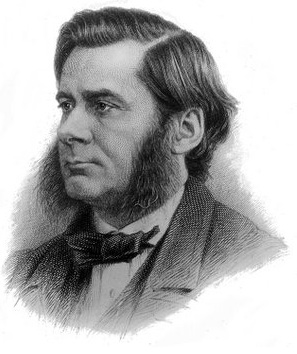Reading on: Defiance and Stoicism
[For another defiant response to the universe as revealed by science see Bertrand Russell’s A Free Man’s Worship.]
Huxley, Thomas H., Evolution and Ethics D. Appleton and Co., New York 1894 [abridged— 570 words] — combating the notion that “survival of the fittest” pertains to human society.
Men in society are undoubtedly subject to the cosmic process. As among other animals, multiplicati on goes on without cessation, and involves severe competition for the means of support. The struggle for existence tends to eliminate those less fitted to adapt themselves to the circumstances of their existence. The strongest, the most self-assertive, tend to tread down the weaker. But the influence of the cosmic process on the evolution of society is the greater the more rudimentary its civilization. Social progress means a checking of the cosmic process at every step and the substitution for it of another, which may be called the ethical process; the end of which is not the survival of those who may happen to be the fittest but of those who are ethically the best.
As I have already urged, the practice of that which is ethically best—what we call goodness or virtue — involves a course of conduct which, in all respects, is opposed to that which leads to success in the cosmic struggle for existence. In place of ruthless self-assertion it demands self-restraint; in place of thrusting aside, or treading down, all competitors, it requires that the individual shall not merely respect, but shall help his fellows; its influence is directed, not so much to the survival of the fittest, as to the fitting of as many as possible to survive. It repudiates the gladiatorial theory of existence. It demands that each man who enters into the enjoyment of the advantages of a polity shall be mindful of his debt to those who have laboriously constructed it; and shall take heed that no act of his weakens the fabric in which he has been permitted to live.
Laws
and moral precepts are directed to the end of curbing the cosmic
process and reminding the individual of his duty to the community,
to the protection and influence of which he owes, if not existence
itself, at least the life of something better than a brutal savage.
It is from neglect of these plain considerations that the fanatical
individualism of our time attempts’ to apply the analogy of
cosmic nature to society. Once more we have a misapplication of
the stoical injunction to follow nature…
Let us understand, once for all, that the ethical progress of society depends, not on imitating the cosmic process, still less in running away from it -but in combating it. It may seem an audacious proposal thus to pit the microcosm against the macrocosm and to set man to subdue nature to his higher ends; but I venture to think that the great intellectual difference between the ancient times and our day, lies in the solid foundation we have acquired for the hope that such an enterprise may meet, with a certain measure of success.
The history of civilization details the steps by which men have succeeded in building up an artificial world within the cosmos. Fragile reed as he may be, man, as Pascal says, is a thinking reed: there lies within him a fund of energy, operating intelligently and so far akin to that which pervades the universe, that it is competent to influence and modify the cosmic process… We do not yet see our way beyond generalities; and we are befogged by the obtrusion of false analogies and crude anticipations…
We are grown men, and must play the man strong in will; to strive, to seek, to find, and not to yield.


